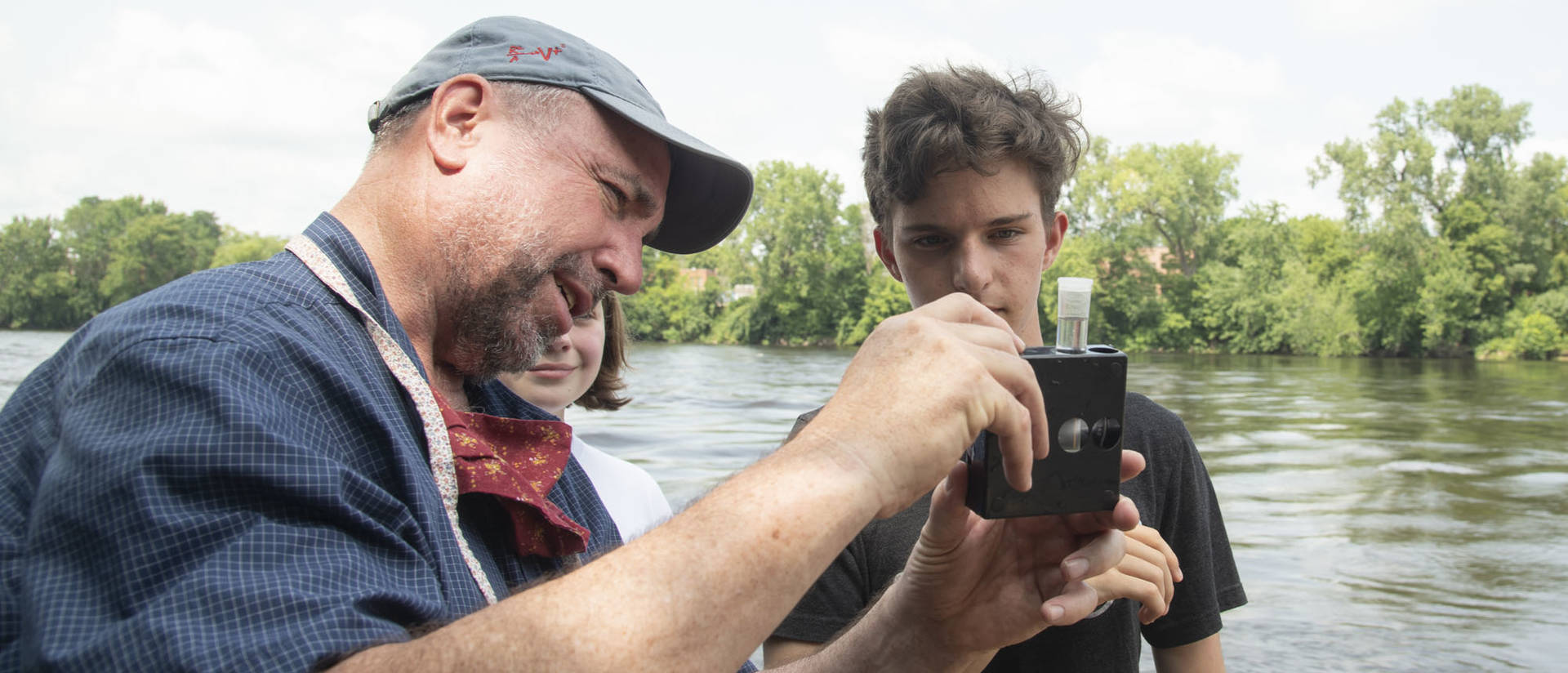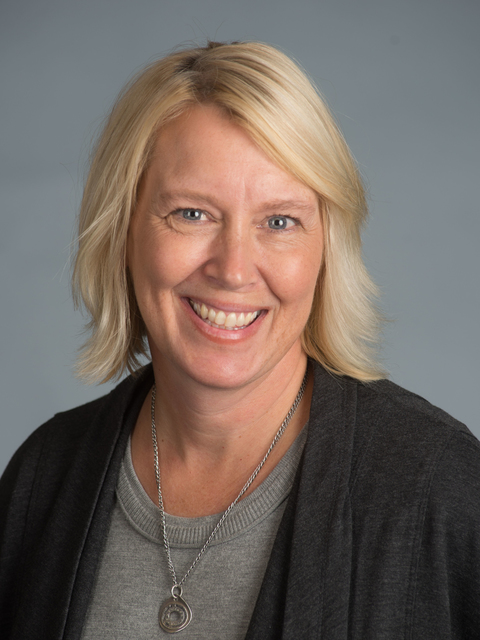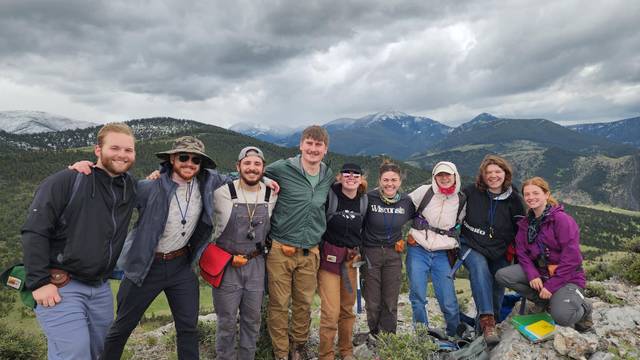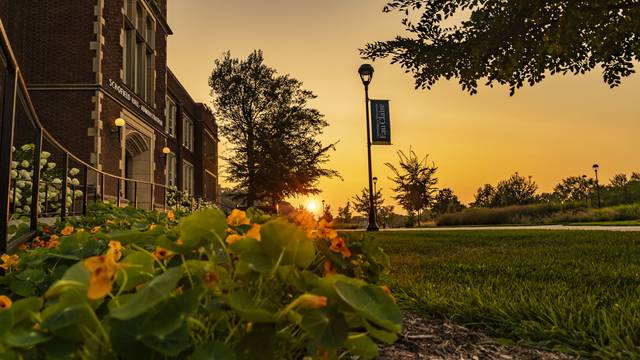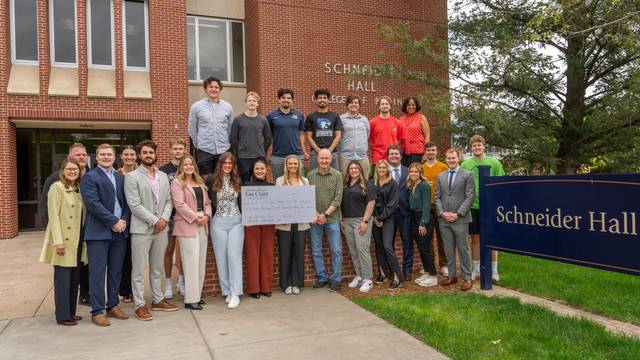Photo caption: UW-Eau Claire geology professor Dr. J. Brian Mahoney shows high schooler Quinten Anger how to use a colorimetric kit to measure nitrate concentration in the Chippewa River. Anger was part of a summer class faculty hope will help inspire high schoolers to consider careers in freshwater science. (Submitted photo)
Growing up in Eau Claire, Emma Johnson knew her hometown’s name means “clear water” but it’s not something she thought much about until a high school environmental science class got her thinking more about the natural world around her.
So, when her teacher told her about a college-level summer program for high school students in western Wisconsin that focuses on freshwater science, Johnson jumped at the chance to be part of it.
“It was an amazing opportunity,” Johnson says of the Freshwater Science Summer Field Experience. “I’ve lived here my whole life, but I got to see new places, to learn new things and to interact with professors who know so much and were so helpful. It was an enriching experience and I’m so glad that I did it.”
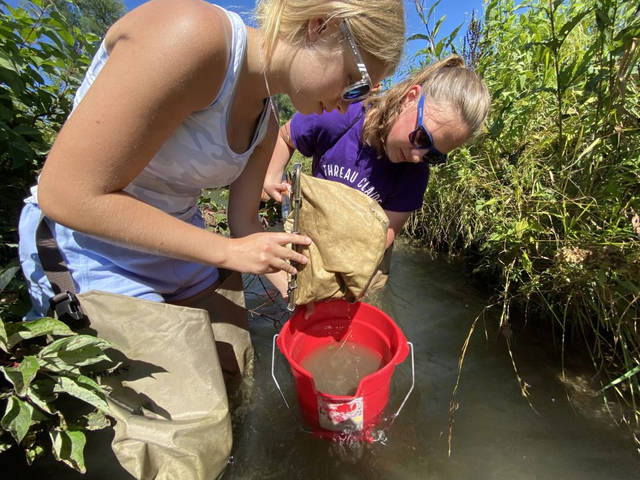
High school students Maddy Knauff, left, and Emma Johnson examine biodiversity in Gilbert Creek, west of Menomonie, as part of a class focused on helping young people understand Wisconsin waterways. (Submitted photo)
Johnson was one of 14 high schoolers from western Wisconsin schools who spent six days this summer studying topics relating to freshwater science, learning alongside faculty from the University of Wisconsin-Eau Claire and three other UW System campuses. Together, they explored sites in Wisconsin and Minnesota, with locations spanning from the Minnesota Zoo to the Chippewa River to Door County.
The inaugural Freshwater Science Summer Field Experience was a tremendous opportunity for all involved, says Dr. Brian Mahoney, a UW-Eau Claire professor of geology who was the faculty lead for the summer program.
“The student comments about the course were outstanding, and their excitement throughout was fantastic,” Mahoney says. “Each one said they thoroughly enjoyed the course, learned a lot and would happily take the course again. They also were confident that many of their friends would jump at the chance to take the course next year.”
Inspiring future scientists
The summer program is an initiative by the newly established Freshwater Collaborative of Wisconsin, an entity developed by 13 UW System campuses, including science faculty at UW-Eau Claire, UW Oshkosh, UW-River Falls and UW-Stout. Its goal is to educate young people about the state’s waterways and potential careers involving freshwater science.
Freshwater lakes, streams and groundwater are an important resource and vital to a sustainable future, Mahoney says. So, it’s critical that today’s scientists inspire future generations to understand and care for our water system and to pursue careers in freshwater science, he says.
“The field experience is an excellent way to help high school students learn how Wisconsin’s water system works, and how they can turn their love of the outdoors, water and science into an exciting career,” Mahoney says. “Our hope is that the experience will inspire these students to attend college and focus on freshwater science.”
Mission accomplished, says Johnson, who now is seriously considering majoring in environmental science when she goes to college next year.
“I have a new appreciation for freshwater and the work that goes into maintaining it,” Johnson says. "The class helped me see general freshwater science topics as applicable skills. This new knowledge and my experiences in the course have made me see environmental science as a very possible future area of study for me."
Learning by doing
The Freshwater Science Summer Field Experience is designed to introduce students to the wonders of and opportunities in freshwater science in Wisconsin, Mahoney says.
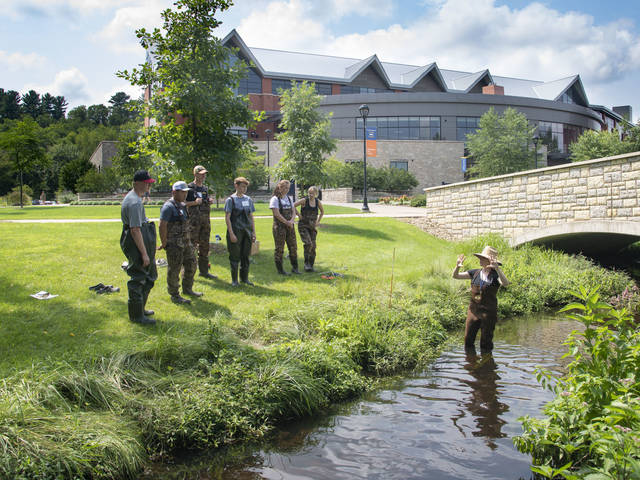
Hydrogeologist Dr. Sarah Vitale, an assistant professor of geology at UW-Eau Claire, explains stream flow measurement in Little Niagara Creek on campus to high school students who were part of a summer class on freshwater science. (Photo by Bill Hoepner)
The program consists of a weeklong series of field-based activities that introduce students to surface water, including lakes, rivers and streams; groundwater; freshwater biology; sustainable agricultural practices; and water quality issues across Wisconsin.
The cost of the course was underwritten by a grant from the Freshwater Collaborative of Wisconsin, so there was no cost to the students, who also could earn two university credits.
The course was taught by teams of researchers from the four UW System campuses, with assistance from undergraduate researchers and high school mentors.
Each day students focused on a new area within freshwater science, learning about new topics and exploring various sites within Wisconsin and Minnesota.
During the weeklong program, students focused on:
- Surface water hydrogeology in western Wisconsin.
- Biology (flora, fauna) of lakes and rivers.
- Groundwater; problems and progress.
- Invasive species in Wisconsin waters.
- Lake algal blooms.
- Freshwater and public health.
- Sustainable agriculture.
- Great Lakes.
- Careers in freshwater science.
Students were introduced to Wisconsin surface water and groundwater systems by studying the Chippewa River and the groundwater well nets on the UW-Eau Claire campus. They learned about biodiversity in riverine systems while kayaking on Half Moon Lake, and they studied watershed biogeochemistry at Lake Menomin and Gilbert Creek.
The study of aquatic invasive species’ impact on ecological restoration took the class to the Minnesota Zoo. Finally, they were introduced to the Great Lakes during their visits to Green Bay and Door County.
“The format was perfect because we learned a lot but without it ever feeling overwhelming,” Johnson says. “I liked that we focused on a new topic every day. It gave us time to think about and process the ideas and information we were discussing each day so we could really understand it better.”
Lake Michigan research
Most of the course centered on western Wisconsin locations, but the students did travel to Door County for the module on the Great Lakes. In Door County, they explored freshwater science as they camped and conducted research at a facility in Whitefish Bay operated by the Environmental Research and Innovation Center of UW Oshkosh.
While she enjoyed the entire program, Johnson says her experiences in Door County were the highlight of the course. She and other students worked in the lab helping to test for microplastics, an experience she never expected to have as a high school student.
Working on research involving Lake Michigan — the largest freshwater system in the world — was an incredible opportunity, she says.
“We did real-world research there,” Johnson says. “It wasn’t just the idea of doing research or learning about the process. We actually used the knowledge we were gaining in freshwater testing labs, the same labs where college students and professional scientists complete their research. That gave us a more authentic understanding of the freshwater science field and a better idea of potential career opportunities within the field."
Looking ahead
While Johnson has not decided on her specific path after her high school graduation, her experiences this summer interacting with and learning alongside college professors has her feeling more comfortable and confident as she looks ahead to college, Johnson says.
“They were all so personable and helpful,” Johnson says of the faculty mentors. “It was nice to talk with them at an academic level. I won’t be as nervous going into college because I already have some experience interacting with professors. I know they are approachable and helpful. Also, I have some nice connections with faculty in this field, so I know that I can go to them with questions about future careers or anything else.”
The faculty organizers already are planning for the 2022 summer session, eager to build on the success of their inaugural program, Mahoney says.
